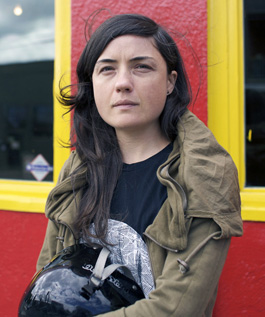home | metro santa cruz index | music calendar

QUIET RIOT: Liz Harris doesn't gib-gab much during her noise concerts.
Shape Shifter
Grouper's Liz Harris disengages the spotlight
By Gabe Meline
NEARLY every musician dreams of one day playing for thousands of fans, but for every 100 hopeful stars, there are one or two to whom music is an art, meant to be refined in small doses. Currently, one of the most prominent members of the latter group is Portland's Liz Harris, who records and performs music under the name Grouper, and who has lately skirted around the edges of popular music with the trepidation of a child around a crocodile pit.
Last year, Harris played for gigantic audiences as the opening act on tour with Animal Collective, the single most critically acclaimed indie band of 2009, and watched her brilliant album Dragging a Dead Deer Up a Hill execute a slow burn into widespread consciousness. Yet in the months since, the elusive musician has resisted pressure to release a full-length follow-up record and shunned the limelight, along with most interviews, to focus on her art studio, her self-released recordings and conceptual projects.
For Harris, 30, touring with Animal Collective was "disengaging," but without pressure. "I knew it wasn't something I was going to pursue, or use it as a rung on a ladder," she told me at a cafe in southeast Portland this past July. Whereas other artists might exploit a high-profile tour to impress industry executives, Harris played strange tape loops, white noise and rhythmless atmospherics. She spoke little to the large crowds. "Also, I had gone through a huge breakup a month before I left on that tour," she adds, "and I was so blown away. So the fact that I was going on tour with this band that was selling out all their shows? I felt like I didn't notice it."
Harris grew up in a North Bay commune called the Group (the kids there called each other "Groupers") and graduated from Petaluma High School before studying at UC-Berkeley and working, briefly, as a commercial illustrator in Los Angeles. Fleeing Southern California, she came north and devoted herself to music, releasing hazy, meditative experimental records through friends' labels and through the San Francisco label Root Strata.
"The best sounds I get are from recording things wrong," she explains, "in layers passed over each other, taped and retaped, broken equipment and odd EQing." Yet an acoustic guitar provided a change for 2008's Dragging a Dead Deer Up a Hill. The looming presence on previous Grouper albums shape-shifted into structured songs, with ethereal strumming and doubled vocals. She says the record felt like a vulnerable experiment. Instead, it landed on many critics' year-end lists—somewhat to Harris' chagrin.
"I was really apprehensive to put that out, because it felt like my weird off-album," she admits, wringing her hands together between her knees. "I was embarrassed to put it out. It was more poppy and open than anything I'd done, so I didn't know what to think of it, or if I even liked it."
Harris retreated. To follow it up, she self-released Vessel, a vinyl-only record containing five "purposely meandering" songs alongside music by Roy Montgomery, a New Zealand guitarist. She silkscreened original artwork to include in each of 500 copies of the record—"I didn't want to make more records than people want," she says—and they sold out immediately. (Copies swiftly made the rounds on eBay for up to $100.) Other artistic projects included performing a live tape-loop score to Andrei Tarkovsky's 1979 film Stalker, and this year Harris is releasing Divide, a book of original art due this fall.
In live shows, Harris plays little from Dragging a Dead Deer, instead aligning her atmospherics with the umbrella genre of "noise," a term she admits is ill-fitting. "I feel like some things," Harris says, "in order to talk about them, if you're talking about something elusive like emotions or dreams, you have to look at them from the corner of your eye. That's the beauty in them. They can't be tied down, and they aren't in one shape."
Last month at the Berkeley Art Museum, Harris premiered a site-specific work called Sleep, which utilized the natural echo of the cavernous concrete space. As hundreds of mostly twentysomethings sat on the floor beneath high-hanging mobiles made from small, silver triangles, Harris cautiously strummed her guitar, listening for the delayed sounds. This happened for 35 minutes, and then a voice from a handheld tape recorder somewhere in the museum uttered a sentence fragment, and then Harris stood up and left. Seven silent minutes later, the museum filled with applause.
GROUPER plays the On Land Festival, running Sept. 2–5, at Café du Nord in San Francisco. Full schedule at www.onlandfestival.com.
Send letters to the editor here.
|
|
|
|
|
|